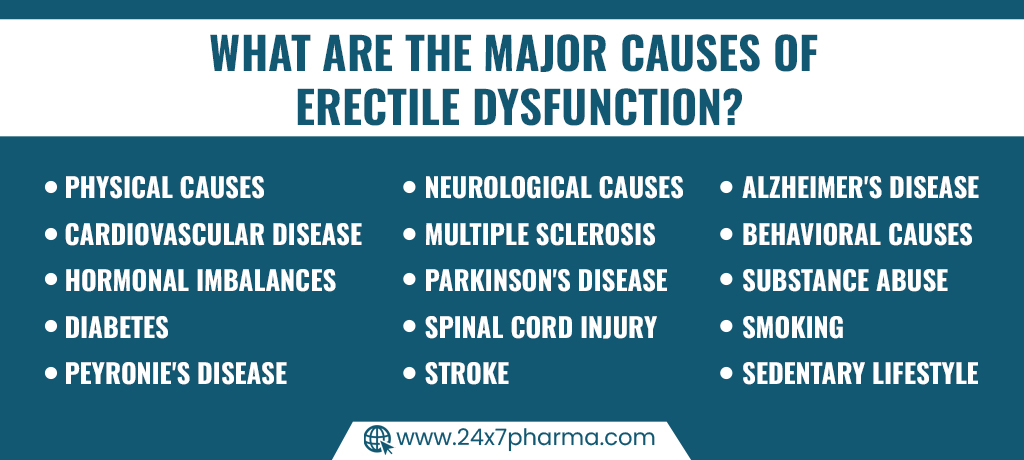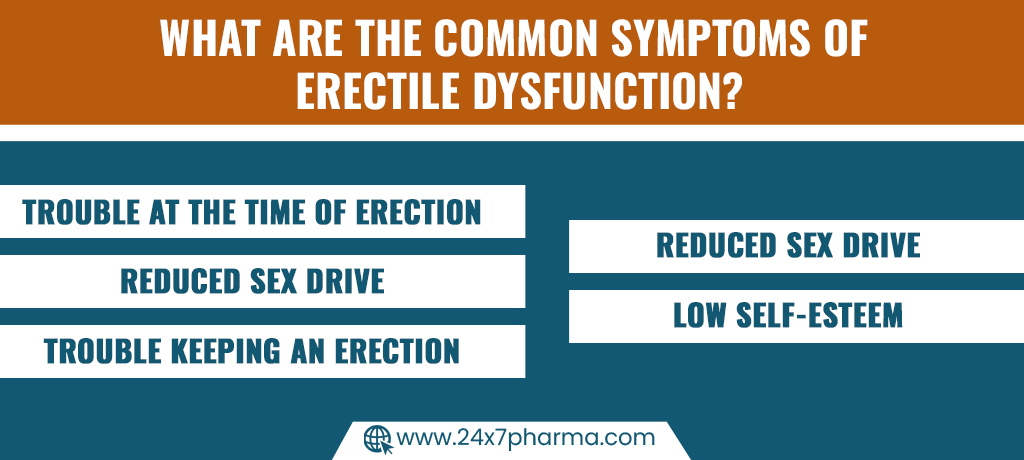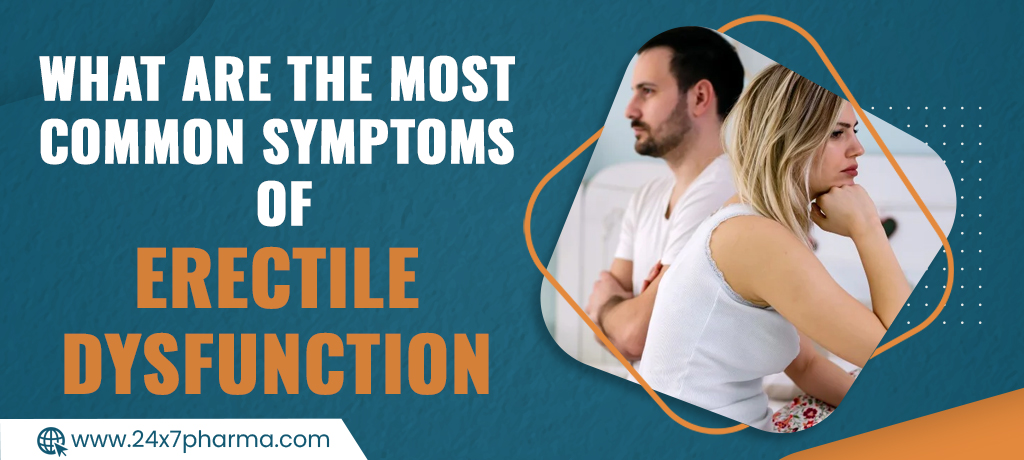Let’s talk about something that affects millions of men worldwide: erectile dysfunction. It’s frustrating and often humiliating, but remember, you’re not alone. So, what are the most common ED symptoms? Let’s get started.
Before we get into the Most Common Symptoms of ED, let’s define erectile dysfunction.
What is Erectile Dysfunction?
-
- Erectile dysfunction, or ED, is a sexual health condition in which a man’s ability to achieve or maintain an erection during sexual activity is impaired. While it is commonly thought to be a problem that only affects older men, it can affect anyone at any age.
- The causes of ED can be physical, psychological, or a combination of the two. ED can significantly impact a person’s life, affecting not only their sexual relationships but also their overall well-being and mental health.
- Fortunately, several treatment options are available, and consulting with a healthcare professional is the first step toward finding a solution.
What are the Major Causes of Erectile Dysfunction?

Erectile dysfunction is a common condition caused by several factors. The causes of ED can be complex and multifaceted, ranging from physical health issues to psychological stressors. So, what are the primary causes of this irritating condition? Let us investigate further.
Physical Causes
Physical causes of ED are frequently linked to underlying health issues that can interfere with the body’s ability to achieve or maintain an erection.
-
-
- Cardiovascular Disease: Poor circulation can impair blood flow to the penis, making achieving and maintaining an erection difficult. High blood pressure, high cholesterol, and atherosclerosis can all impact cardiovascular health and lead to ED.
- Hormonal Imbalances: Low testosterone levels, a key hormone for male sexual health, can lead to ED. Other hormonal imbalances, such as thyroid issues, can also have an effect on sexual function.
- Diabetes: Diabetes can damage blood vessels and nerves, resulting in complications like ED.
- Peyronie’s Disease: This condition is characterized by the formation of scar tissue in the penis, which can cause curvature and pain during erections.
-
Neurological Causes
In addition to physical health issues, neurological causes of erectile dysfunction can exist. The nervous system is vital to sexual function, and damage or dysfunction in this system can result in common symptoms of ED. Some of the most common neurological causes of ED are listed below.
-
-
- Multiple Sclerosis: This autoimmune disease can damage the nerves that control sexual function, leading to ED.
- Parkinson’s Disease: Parkinson’s can also affect the nerves that control sexual function, making it more difficult to achieve or maintain an erection.
- Spinal Cord Injury: Damage to the spinal cord can impact the nerves that control sexual function, making it difficult to achieve or maintain an erection.
- Stroke: Strokes can cause damage to the brain and nervous system, which can impact sexual function.
- Alzheimer’s Disease: This progressive neurological disorder can also impact sexual function as it progresses.
-
Behavioral Causes
Erectile dysfunction behavioral causes can also play a significant role in developing this frustrating condition. Some of the most common behavioral causes of ED are listed below.
-
-
- Substance Abuse: Excessive alcohol consumption and drug use can impact sexual function and lead to ED.
- Smoking: Smoking can damage blood vessels and decrease circulation, leading to erectile dysfunction.
- Sedentary Lifestyle: Lack of physical activity can contribute to poor circulation and an increased risk of obesity, both of which can lead to ED.
- Stress and Anxiety: Psychological stressors can impact sexual function and contribute to ED.
- Relationship Issues: Problems in a relationship can also impact sexual function, making it more difficult to achieve or maintain an erection.
-
Medications
While medications can save lives in many cases, they can also have side effects that affect sexual function. Here are some examples of how medications can cause erectile dysfunction.
-
-
- Blood Pressure Medications: Many blood pressure medications can impact sexual function by decreasing blood flow to the penis or interfering with nerve impulses that control erections.
- Antidepressants: Certain antidepressants can cause sexual side effects, including erectile dysfunction.
- Hormonal Medications: Medications that impact hormone levels, such as those used to treat prostate cancer, can cause ED.
- Diuretics: These medications can lead to dehydration, impacting sexual function.
- Antihistamines: Some antihistamines can cause sexual side effects, including ED.
-
Trauma
Physical or psychological trauma can also contribute to the development of erectile dysfunction. Here are some of the ways trauma can lead to ED.
-
-
- Physical Trauma: Trauma to the genital area can cause damage to blood vessels and nerves, leading to ED.
- Emotional Trauma: Emotional trauma, such as sexual abuse or assault, can impact sexual function and contribute to ED.
- Post-Traumatic Stress Disorder (PTSD): PTSD can impact sexual function by causing anxiety and depression and altering the body’s balance of hormones.
- Performance Anxiety: Experiencing ED once can lead to performance anxiety, which can contribute to a cycle of ED and anxiety.
- Relationship Trauma: Trauma within a relationship, such as infidelity or emotional abuse, can impact sexual function and contribute to ED.
-
Read More : Erectile Dysfunction Treatment – Other Than Just ED Pills
How Common is ED?
-
- Erectile dysfunction is a widespread problem that affects men of all ages. While it is commonly thought to be a condition that only affects older men, it can also affect younger men. In fact, up to 30 million men in the United States are estimated to have ED at some point.
- Even though ED is common, many men are embarrassed or ashamed to seek treatment. However, it is critical to recognize that ED is a treatable condition, with various options available to improve sexual function.
- There are numerous ways to address the underlying causes of ED and improve sexual health, ranging from lifestyle changes to medications to counselling.
- If you’re experiencing ED symptoms, don’t hesitate to speak with your doctor about your treatment options.
What are the Common Symptoms of Erectile Dysfunction?
 Erectile dysfunction can manifest itself in various ways, with symptoms varying from person to person. However, a few common symptoms may indicate you are suffering from ED.
Erectile dysfunction can manifest itself in various ways, with symptoms varying from person to person. However, a few common symptoms may indicate you are suffering from ED.
Trouble at the Time of Erection
-
-
- A common symptom of erectile dysfunction is difficulty achieving or maintaining an erection during sexual activity. For men, this can be a frustrating and distressing experience, affecting their ability to engage in sexual activity and leading to feelings of inadequacy or shame.
- While occasional difficulties achieving or maintaining an erection are normal, persistent difficulty achieving or maintaining an erection long enough for satisfying sexual activity may indicate underlying ED.
- It’s critical for men experiencing this symptom to consult with their doctor, as several treatments are available to address the underlying causes of ED and improve sexual function.
-
Trouble Keeping an Erection
-
-
- A Common Symptom of ED is the difficulty maintaining an erection during sexual activity. This cannot be very comforting and impact a man’s confidence and intimate relationships.
- While some men may achieve an erection, it may be brief and insufficient for fulfilling sexual activity. Others may be unable to obtain an erection at all.
- Seeking medical attention if you are having trouble maintaining an erection is critical, as numerous treatments are available to address the root causes of ED and restore healthy sexual function. Don’t let ED ruin your intimate relationships or personal life; seek professional help.
-
Reduced Sex Drive
-
-
- Reduced sex drive is another symptom of erectile dysfunction and difficulty achieving or maintaining an erection. Men with ED may lose interest in sexual activity or discover that it takes longer to become aroused than it used to.
- This can cause frustration and anxiety for the man experiencing these symptoms and his partner. While reduced sex drive can have a variety of underlying causes, like other Common Symptoms of ED, men should be aware that it can be a symptom of ED and should consult with their healthcare provider if they are experiencing this or other symptoms.
-
Low Self-Esteem
-
-
- Erectile dysfunction can cause men a great deal of embarrassment and frustration, as well as a significant drop in self-esteem. Men with ED may feel unable to perform their responsibilities as partners, making them feel less masculine and less confident in their sexual abilities.
- This can have a knock-on effect in other areas of their lives, resulting in a diminished sense of self-worth and self-esteem. Seeking professional help to address the underlying causes of Common Symptoms of ED can help restore a man’s confidence and self-esteem, allowing him to engage in healthy and fulfilling sexual relationships.
-
Feeling Embarrassed
-
-
- For men, erectile dysfunction can be an embarrassing and frustrating experience, and feeling embarrassed is a common symptom that often goes along with it.
- Men suffering from ED may be embarrassed or ashamed to discuss their sexual health with their partner or healthcare provider, leading to isolation and anxiety.
- This can impact their self-esteem and quality of life, and men should be aware that ED is a common and treatable condition.
- Seeking professional assistance can help to alleviate the embarrassment associated with ED and lead to effective treatments that can help improve sexual function and overall well-being.
-
Risk Factors for Erectile Dysfunction
Several risk factors can increase the likelihood of developing erectile dysfunction. Here are some of the most significant:
-
- Age: ED becomes more common as men age, with an estimated 40% of men experiencing some degree of ED by age 40.
- Chronic Medical Conditions: Health conditions such as high blood pressure, diabetes, and heart disease can damage blood vessels and nerves, leading to ED.
- Lifestyle Factors: Smoking, excessive alcohol consumption, and drug use can all contribute to the development of ED.
- Obesity: Men who are overweight or obese are more likely to experience ED.
- Psychological Factors: Depression, anxiety, and stress can all impact sexual function and increase the risk of developing ED.
Treatment for Erectile Dysfunction
Erectile dysfunction (ED) is a common issue that can hurt a man’s quality of life. Fortunately, several treatments available can help address the underlying causes of ED while also improving sexual function.
Medications
-
-
- One of the most commonly used treatments for ED is medication, such as Sildenafil Citrate Tablets, which increase blood flow to the penis, resulting in improved erections.
- Popular Sildenafil Citrate Tablet brands include cenforce 100 mg and cenforce 200 mg. These medications should be taken as prescribed by a healthcare provider and can have potential side effects, so it’s important to discuss them with a doctor before taking them.
-
Other Treatments
-
-
- Other treatments for ED may include dietary and lifestyle changes, as well as therapy and counselling to address any psychological factors contributing to the problem. Vacuum devices or penile injections may also be effective for some men.
- Finally, the best treatment plan for ED will be determined by the individual and their unique circumstances, so it’s critical to collaborate closely with a healthcare provider to develop a personalized approach.
-
Conclusion
-
- To summarize, the most Common Symptoms of ED are difficulty achieving or maintaining an erection, decreased sex drive, low self-esteem, and feelings of embarrassment.
- If you are experiencing any of these symptoms, you must consult your healthcare provider to discuss treatment options. There is no need to suffer in silence when effective treatments are available, such as Sildenafil citrate tablets, Cenforce 100 pills, and Cenforce 200.
- Don’t let erectile dysfunction ruin your life or your relationships. Take action and seek assistance right away.

